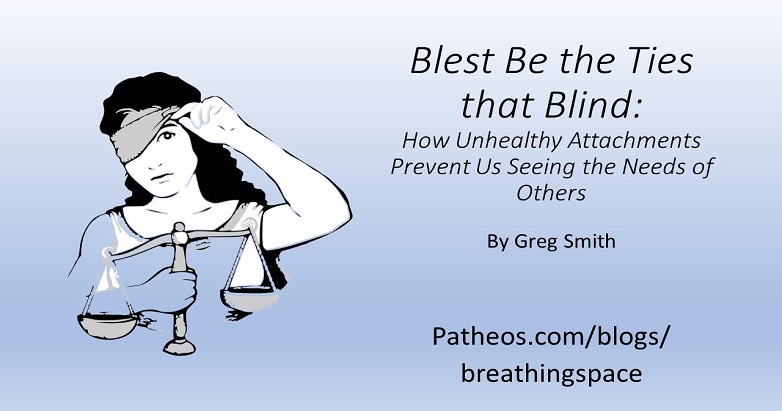The Lord’s Supper was over. The last morsel was chewed, the final drop swallowed, and the covers placed carefully back on the silver Communion set. With a single chord from the piano, members of the little congregation left their pews to form a circle down the center aisle. Strong voices making up for the quavering ones, we lifted our hearts in a single theme: “Blest be the tie that binds our hearts in Christian love; The fellowship of kindred minds is like to that above.” Your church sings it too. It might be just ritual, but maybe it moves you every time.
When you share the intimacies of life with members of your church, you grow together as a spiritual community. But there is a shadow side to this surrogate family we call the church. Sometimes we might honestly sing, “Blest be the ties that blind.”

The Ties that Blind
In a church youth group game of blind man’s bluff, a discarded necktie served as a blindfold. Wrapped two or three times around a kid’s head, it prevented all sight. Sometimes our church ties—the ties we have to people, positions, and power—can blind us just as effectively. Unhealthy attachments can blind us to the things that really matter. Or prevent us from seeing the harm that’s happening right in front of us. It’s hard to see the damage that closeness might bring, when our hearts are full of good intentions. But the ties that blind can keep us in the dark, and unaware of other people’s pain.
Turning a Blind Eye
Contrary to our call to care for the most vulnerable, church ties can cause us to ignore suffering. Former Pope Benedict XVI just apologized for sexual abuses that took place while he was the archbishop of Munich, but claimed no responsibility for personal wrongdoing. The Roman Catholic Church is not alone in ignoring sexual misconduct. The largest Protestant denomination in the U.S., the Southern Baptist Convention, has similarly been torn apart by sexual abuse scandals and coverups. Too often, leaders have chosen to blind themselves to the pain of abuse because of ties to their careers. Or, they allow attachment to beloved church members who are guilty of violations. Rather than shining a light on these atrocities, they let their ties darken their eyes to the truth. They look the other way, instead of protecting the vulnerable.
Step Out of the Darkness
In church, it’s easy to get tied to beliefs. But when those ties blind you to fresh ideas that may serve you better, that darkness could lead to a fall. You’ve known people who said, “We’ve always been (choose the denomination) and we always will be.” So bound to one perspective, these precious folks prevent themselves from seeing anything beyond their own tradition. Other are so bound to a political party that they will never allow themselves to see another’s position. Still others remain so tied to religious doctrines that they refuse to consider alternatives. Jesus said, “I am the light,” and called his followers to step out of the darkness. He challenged them to reconsider the beliefs they were raised with, and to accept a new truth as led by the Holy Spirit. Spiritual growth never comes without exposing ourselves to innovative ideas about God and the world. Growth can only happen when we loosely hold our attachment to thoughts, consider that we may have been wrong, and willingly remove the blindfolds so we can see.
Injustice is Blind
They say that justice is blind—in fact, it’s quite the opposite. Often, church ties blind our eyes so effectively that we can’t see the injustices around us. Injustice is blind to the disparities of this world. Injustice doesn’t see the inequities, biases, discriminations, and imbalances in society. Unfortunately, ties to our racially, ethnically, socioeconomically, and linguistically segregated churches have caused us to see the world through the glasses of our own experience. In this case, church ties blind us to the plight of those who are different. When all our friends are from church, and church folks look just like us, then those ties blind us to the injustices that take place in a world of diversity.
Changing Our Tune
Our congregation sang, “We share our mutual woes, our mutual burdens bear, and often for each other flows the sympathizing tear.” The classic hymn beautifully depicts the loving connection between Christians. But the only way to avoid becoming “The Ties that Blind” or “The Lies that Blind,” is if we extend this verse to include the whole world. While we’re at it, we would do well to change the first verse to Blest be the tie that binds our hearts in human love.” Because while love for our fellow believers is important, it’s easy for those ties to blind us to the needs of others. And it’s tempting for our leaders to concoct lies to bind us together as a community of faith, and to scare us out of leaving. Only when we change our tune can we prevent Christianity from becoming a cloistered community that only loves itself instead of cherishing the world.












